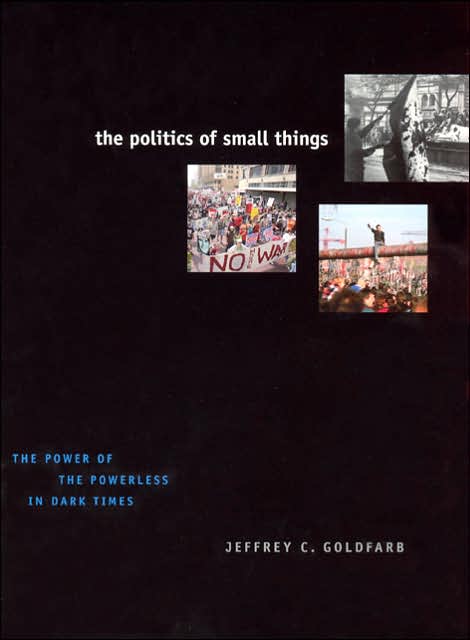
 Democracy, social justice, freedom, cultural refinement and pleasure, all, along with their opposites, are to be found in the detailed meetings and avoidances, engagements and disengagements, comings and goings of everyday life. The politics of small things has been our theme of the week.
Democracy, social justice, freedom, cultural refinement and pleasure, all, along with their opposites, are to be found in the detailed meetings and avoidances, engagements and disengagements, comings and goings of everyday life. The politics of small things has been our theme of the week.
Adam Michnik and I decided to try to organize our friends in a common discussion. Despite the workings of the security police and his jailers, and despite the hard realities of the cold war, we created alternatives in our own lives, and this affected many others. Although I am not informed about the specifics, I am sure that such things are now happening in China.
But I should be clear. I am not saying that therefore, the People’s Republic’s days are numbered, or that liberal democracy is just around the corner. Escalation in repression is quite a likely prospect. Michnik’s life after receiving our honorary doctorate did at first lead to a prison cell. Shirin Ebadi is in exile today, as was Aleksandr Solzhenitsyn after his prize. But people continue to interact around the shared human rights principles to which these people dedicated their lives, and this has persistent effects, at least for those people, but beyond their social circles as well. As Michnik put it “the value of our struggle lies not in its chances for victory but rather in the values of its cause.” My point is that if people keep acting according to those values, they are very much alive and consequential.
And it is in this way that I applaud the Afghan Womens Soccer team and  understand its significance. That these young women manage to play their game despite all the horrors of war and occupation, despite the persistence of harmful traditional practices and inadequate implementation of the law on elimination of violence against women in Afghanistan (this was the subject matter of the UN report that Denis Fitzgerald referred to in his reply to my post) is their great achievement. We have to pay attention to such achievements, and . . .
understand its significance. That these young women manage to play their game despite all the horrors of war and occupation, despite the persistence of harmful traditional practices and inadequate implementation of the law on elimination of violence against women in Afghanistan (this was the subject matter of the UN report that Denis Fitzgerald referred to in his reply to my post) is their great achievement. We have to pay attention to such achievements, and . . .
Read more: DC Week in Review: the significance of the politics of small things

